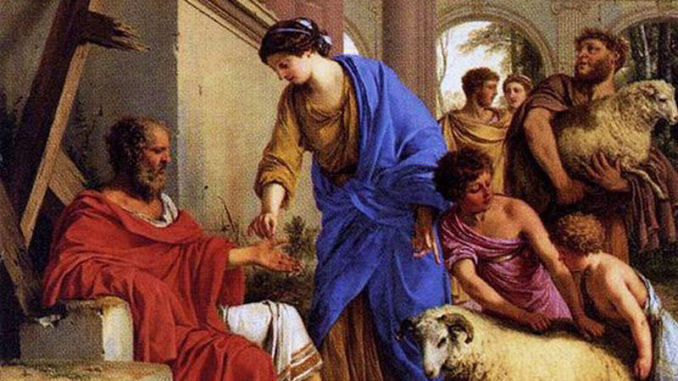
Even Pope Francis seems to be affected by it. The first time I encountered the phenomenon termed survivors’ guilt was when a young Girl Scout drowned at our regional camp. Her grandparents wondered aloud why they, with their collection of ailments, were still living, while a 13-year-old had been caught in a whirlpool in a supposedly unthreatening woodland creek. The highly trained lifeguard, too, was shaken to the core by her helplessness.
The Holy Father, in a meditation recently posted on “Missio,” remarked on meeting migrants, jobless youth, and persons suffering with “a hell of pain inside” and wondered “Why them and not me?” It’s an often repeated question.
Over the years I have heard of parents distressed by the deaths of children, friends upset when the sober driver of a car full of underage drinkers is the one killed in a car accident, a wife tormented when her husband died in a plane crash after he impulsively changed flights to get home early and surprise her. Then there was my brother who broke out in shingles and stayed home in Brooklyn the day jets crashed into the Twin Towers.
Why this one, why them, and not me? The question occurs and recurs. And now, in our diocese, there are surely some who are asking themselves why they, at 92 or 82 or 72, have outlived a talented and dynamic 42-year-old priest.
We get little comfort from the Book of Job. After this classic Old Testament sufferer has endured the lame-brained explanations offered by his supposed friends, he demands an explanation from God. What he gets are more questions, this time posed by God. They boil down to “Where were you when I made the world?” Job has to accept that some things are beyond his comprehension.
What Job does admit, though, is that he has experienced God amid his suffering — and that he cannot pin evil on God. Some evil, and some of the mind-boggling pain of the world, is indeed wrought by the perverse free will of human beings and the diabolical will of the Evil One. Other things are attributable to a certain freedom of the natural world to act naturally. The earth quakes, hurricanes wreak havoc, wildfires burn, and animals attack. The circulatory system can malfunction. New viruses can afflict and kill.
St. Thomas Aquinas advised in his “Summa contra Gentiles” that chance too is a part of Divine Providence. That is to say, God’s will gets done, but there are a number of ways that can happen.
And then St. Paul, in Romans, reminds us that all things work together for good for those who love God. The core of the Easter message is that evil and tragedy never have the final say.
As the Gospel of John draws to a close, St. Peter is counseled by the Lord to expect gruesome suffering for the sake of the gospel. In his inimitable way, he looks at St. John and asks, “What about him?” The Lord responds, “What if I want him to remain until I come?” If we follow the story, we find that John died an old man, exiled on the isle of Patmos.
We may wonder whether he, the only apostle to escape martyrdom, ever felt survivor’s guilt. If he had not lived, however, we might not have had the Book of Revelation. That apocalyptic work assures us that, after everything, there will be no more crying out or pain. There will be a new heaven and a new earth. For us survivors there may also be some clear answers.

